Strictly Personal
Signs of an Emerging France-Algeria-Tunisia Axis to Restrain Morocco by Samir Bennis
Published
2 years agoon

The three countries appear to be rallying around a shared goal of countering Morocco’s growing diplomatic assertiveness at both the regional and worldwide levels.
Washington DC – In a speech he gave last November, King Mohammed VI emphatically laid out what good diplomatic relations with Morocco require or entail. Rabat, the King insisted, will not enter any trade deals with countries that hold ambiguous or hostile positions regarding its territorial integrity.
He confirmed this in the speech he gave last week, and it is already showing which countries are friendly to Morocco and which are opposed to its strategic interests.
The high-level reception with which Tunisian President Kais Saied honored the leader of the Separatist Polisario Front is a strong indication of Tunisia’s (newfound) stance on the Sahara dispute.
While the Tunisian Foreign Affairs Ministry has since tried to play down the political significance of President Saied’s gesture, lavishing on the Polisario chief honors traditionally reserved for a visiting head of state is perhaps to date the best evidence that Tunisia has chosen its side in the complex Western Sahara saga. It has joined the ever-irrelevant — though unceasingly active and vocal — axis of countries supporting the Algerian regime’s agenda of opposing Moroccan territorial integrity.
It, therefore, seems that Morocco has yet again entered a crucial and very sensitive phase in its efforts to settle the Western Sahara question. Underlying the apparent resurgence of this anti-Morocco axis is that the diplomatic breakthroughs that Rabat has achieved in the past few years have started to annoy some countries that Moroccans used to look to as allies and friendly states.
There is no doubt that the Tunisian president’s move, which amounts to a de facto acknowledgment of the Polisario’s fictitious state, was a shock to the Moroccan people. To Morocco, President Saied’s gesture was nothing short of a betrayal: of the historical, social, and cultural ties binding the friendship of the Moroccan and Tunisian peoples; and of the traditionally strong diplomatic ties between Rabat and Tunis.
The best demonstration of these ties was King Mohammed VI’s visit to Tunisia in 2014. Traveling to what he called a “sisterly nation” amid post-Arab Spring turmoil characterized by a spate of vicious terrorist attacks in Tunis and elsewhere in the country, the Moroccan monarch roamed the streets of the Tunisian capital in a show of fraternal support to a people that needed a morale boost to embark on the perilous journey of a political transition.
The goal of the visit was to send a strong message to the international community: That Tunisia was fine, and that it was stable despite those attacks. The visit was well received by the Tunisian people.
Throughout the past decades, whether in the era of Habib Bourguiba, Zine El Abidine Ben Ali, Moncef El Marzouki, or Beji Caid Essebsi, Tunisia has strived to stay neutral in the Western Sahara dossier, notably by distancing itself from any action that could sour its relations with Morocco.
The broader context of the Polisario leader’s visit to Tunisia – the escalating Rabat-Algiers tensions, King Mohammed VI’s remarks about the centrality of the Sahara to Morocco, and France‘s Emmanuel Macron visit to Algeria amid Paris-Rabat tensions — – points to the birth of a trilateral Algerian-French-Tunisian alliance aiming to further prolong the Western Sahara conflict and stand in the way of Morocco’s widely applauded and increasingly successful efforts to close this file.
Signs and Motives of the Emerging Anti-Rabat Axis
The signs of this alliance started showing more than a year ago. Perhaps one of the most important was Tunisia’s abstaining from voting on a Security Council resolution concerning the Sahara last October.
That abstention upended the tradition that Arab countries have upheld since the late sixties, a tradition whereby Arab members of the UN Security Council typically strive to vote for decisions that enjoy wide support from other Arab countries.
Put differently, Arab countries sitting on the UN Security Council have continuously voted in favor of resolutions concerning the Western Sahara dispute. Even Algeria itself voted for “relevant” Security Council resolutions when it was a member of the UN body in 2004 and 2005.
Tunisia’s abstention was thus crucial as a sign that President Saied’s regime has become an appendage of the Algeria regime, working faithfully to implement its agenda. The first sign of Tunisian-Algerian convergence and President Saied’s resolve to align with Algeria at the cost of Tunisia’s decades-long neutrality on the Sahara question was his decision to make Algeria the destination of his first official visit abroad as president in February 2020.
During President Saied’s visit, the Algerian regime eagerly announced its decision to deposit $150 million in the Central Bank of Tunisia in the form of a grant that could help Tunisia facilitate payments for access to Algerian gas.
The visit was thus a telling declaration of intentions from both the Tunisian and Algerian regimes, who have ever since appeared to be striving to deepen bilateral ties to form a Maghrebi bloc to undermine Morocco’s strategic interests.
Responding to Tunisia’s President’s nicety, Algeria’s President Abdelmadjid Tebboune visited Tunisia in December 2021. During that visit, he granted Tunisia a $300 million (MAD 3.2 billion) loan to help it overcome its dire economic crisis.
High-level visits between the two countries continued, with the latest being a visit by Algerian Foreign Minister, Ramtane Lamaamra last June, and he too was welcomed by President Kais Saied.
While Tunisia secured financial and political support from the Algerian regime, France rushed to support Saied politically and give him the legitimacy he lacked at the domestic level.
France’s support was on display during the meeting that the French Ambassador to Tunisia held with the country’s Foreign Minister in January, when he stressed Paris’s commitment to supporting the Tunisian regime’s efforts to secure loans from the International Monetary Fund.
He also expressed France’s support for Saied’s efforts to “strengthen democracy and the rule of law” in Tunisia.
Conversely, Moroccan-Tunisian relations entered a period of unprecedented stagnation and a nearly total absence of communication between the countries’ high-level officials. One major evidence of this stagnation was the fact that it took the Tunisian president two years and three months to receive Morocco’s ambassador Hassan Tariq. The Moroccan diplomat was only able to present his credentials in January.
Neither did Tunisia’s President respond to the invitation that King Mohammed VI extended to him in January 2020 to visit Morocco.
Tunisia’s decision and Moroccan-French tensions
Tunisia’s decision to host the Polisario chief should also be analyzed in relation to simmering tensions between Morocco and France over the past four years, which deepened when the United States recognized Morocco’s sovereignty over the Sahara.
While France has ostensibly supported Morocco at the UN Security Council in the past 15 years, that support was never absolute, nor did it translate into a genuine desire to undo the damage France inflicted on Morocco’s territorial integrity at the height of Europe’s struggle for Morocco’s spoils in the early 20th century.
France has simply kept using the same phrase over the past decade, stressing that Morocco’s Autonomy Plan is a “serious” and “reliable” basis on which the parties to the Sahara dispute could build a lasting political solution.
This stance has come at no political risk for France, for while it has appeared to be supportive of Morocco, Paris has made sure to never take a position that could alienate Algeria. France has thus labored to keep its strategic interests in Algeria unscathed while paying lip service to Morocco’s territorial integrity.
At the same time, preserving this half-hearted French support has come at a great economic cost for Morocco over the past 15 years. To please France and maintain its symbolic support of the Moroccan Autonomy Plan, Morocco was forced to give it preferential treatment by granting French companies the lion’s share of huge infrastructure projects in the country over the past two decades.
But Morocco has increasingly taken steps to diversify its diplomatic base, and France’s erstwhile monopolistic economic interests in the kingdom have appeared to be on shaky grounds since Morocco secured the US recognition of its sovereignty over Western Sahara.
One could safely argue that the US recognition was a shocking blow that took the French political class off guard. It came at a time when Morocco was visibly growing weary of France’s double-speak and its apparent lack of genuine desire to end the Sahara dispute.
It also came as relations between Paris and Rabat had witnessed several bouts of tensions since 2014. Morocco had undertaken to curtail French dominance over its economy and to chart its own path both at the domestic and international levels. Not only has Morocco sought to diminish France’s stranglehold over its economy, but it has also sought to compete with Paris in Sub-Saharan Africa, especially in West Africa where Morocco is now among the most important foreign investors.
If France was truly serious about its support of Morocco’s Autonomy Plan, the political atmosphere could not have been more ideal to unambiguously say so after the US recognition. Yet, instead of following in the steps of the US — and Spain, more recently — France has chosen to look the other way, thus conveying a clear message about its eagerness to prolong the dispute in order to protect its economic position in Morocco.
Over the past decade, Morocco has given clear signs of its intention to break free from France’s stranglehold over its economy. The country has done so by diversifying and strengthening its strategic partnerships with China, Russia, India, Brazil, Japan, and South Korea.
Naturally, this Moroccan “rebellion” does not sit well with France, where the political and media elite have grown accustomed to regarding Morocco as an exclusively Frenchs backyard.
For the French political establishment, this paradigm shift in Paris-Rabat relations, especially Morocco’s persistence to be treated as an equal partner based on the principles of mutual respect for strategic interests, is an unacceptable and intolerable development.
From the neo-colonial perspective of the French elite, Morocco is but a peripheral state that should remain within France’s sphere of influence, toe the Francafrique lines, and obey Paris’s diktats. Every Moroccan move to break this paradigm is considered a crime of lese-majesty that ought to be nipped in the bud.
The signs of France’s annoyance with Morocco’s new direction started showing when it took Spain’s side during the migration crisis in May 2021, in the midst of a Madrid-Rabat diplomatic crisis that eventually pitted Morocco against the European Union.
The French stance was in contradiction with the supposedly strong Franco-Moroccan relations. In particular, France’s support for Spain was in stark contrast to former French President Jacques Chirac’s endorsement of Morocco during the Perejil Island crisis in July 2002. Taking Morocco’s side against Spain, Chirac had sought to preserve what he saw as a deep-rooted and profoundly strategic “Franco-Moroccan friendship.” The second sign of French discontent at Morocco’s growing diplomatic assertiveness could be the French government’s decision to lower the number of visas issued to Moroccan citizens by 50%. In a bid to fend off suggestions that the visa move was primarily and specifically targeted at Morocco, France added Algeria and Tunisia to the visa restriction list.
In an equally preemptive gesture, Paris claimed that the decision to slash the number of visas annually issued to Moroccans was due to Morocco’s “refusal to cooperate” on the repatriation of Moroccan nationals illegally established in France. Instead, the main reason for the visa move was that, in addition to being displeased with Morocco’s efforts to diversify its strategic partnerships, Paris was increasingly exasperated with Rabat’s constant pressure to clarify its position on the Western Sahara dispute. Another contributing factor is that Morocco has prevented French companies from securing the kind of important, large economic deals that they had traditionally felt entitled to in the North African country.
This included the Dakhla port project, which Morocco’s government has assigned to a Moroccan company. More recently, there have also been signs that France will not be in charge of building a high-speed rail line between Marrakech and Agadir.
All of this shows that French influence will dwindle more in Morocco, as the kingdom shifts more toward forging strategic partnerships from a pragmatic standpoint of mutual benefits.
King Mohammed VI’s speech last week underlined that Morocco intends to continue with its policy built on demanding its traditional allies clearly acknowledge the Moroccanness of the Sahara.
This especially applies to France for playing a major, historical role in laying the groundwork for the start of the Sahara dispute at the beginning of the 20th century, when it divided Morocco up and gave Spain control of the kingdom’s southern provinces when it was still an independent country.
France seems to have received the royal speech’s clear message, which might be a sign of new chapters in the tumultuous relationship between Paris and Rabat. With bilateral relations, there is a high probability that the fabricated video that has been shared since August 24 might have actually been the doing of French intelligence.
France has chosen its camp
President Macron’s recent visit to Algeria after his election for a second term can be considered a sign that France has picked a side in the decades-long Algeria-Morocco rivalry, and that it no longer looks at Morocco as a strategic partner or “political twin.” Additionally, France could work through the alliance it formed with Algeria and Tunisia – who have not rebelled against its political and economic dominance – to undermine every effort Morocco makes to settle the Sahara dispute.
France is well aware that, unlike Algeria and Tunisia where the political regimes suffer from fragility and illegitimacy, Morocco’s political system is built on strong foundations.
The most important of these foundations is the pledge of allegiance between the people and their king, as well as their attachment to the monarchy. The King and People’s Revolution of August 1953 and the political turbulence that followed for two years are the best evidence of the Moroccan people’s loyalty to the monarchy and the sanctity of the pledge of allegiance that ties it to its legitimate kings. This is the best evidence of the failures of the various attempts by France to create a regime that follows its influence, obeys its orders, and serves its interests.
France’s stubbornness and its refusal to support Morocco’s efforts to resolve the Western Sahara dispute stems from its entrenched conviction that Morocco has all the necessary foundations to get rid of its dependence on French influence. For Paris, should Morocco succeed in ending the Sahara conflict in its favor, it would set its sights on reviving the historical role it played before colonialism and again become a link between the Arab World and Africa with the rest of the world.
As France still indulges in its imperialist mindset, with its leaders have failed to make peace with the fact that nations’ histories change and that no status quo is eternal, they maintain the hope of maintaining the century-long influence that France has enjoyed in the Maghreb.
The post-colonial ambitions of France clash with the ambitions of a state like Morocco, which is working to occupy “the position it deserves” in world affairs while diversifying its diplomatic connections and preserving its territorial integrity. As France’s elitist and expansionist mindset considers Morocco as a rebellious satellite state that needs to be put in its place, it will work on building an alliance with two illegitimate regimes to serve its interests and obstruct all efforts by Morocco to get rid of the consequences of French occupation.
It goes without saying that countering this intricate, emerging anti-Morocco axis requires the mobilization of all the political, economic, strategic, and human assets Morocco can — and should — muster to preserve its recent, wide-ranging diplomatic breakthroughs and defend its territorial integrity.
You may like
-


Air Peace, capitalism and national interest, By Dakuku Peterside
-


This is chaos, not governance, and we must stop it, By Tee Ngugi
-


Off we go again with public shows, humbug and clowning, By Jenerali Uliwengu
-


How patriarchy underpins gender violence today, By Tee Ngugi
-


Help! There’s a dangerous, secret plot to save the EAC from imminent death, By Charles Onyango-Obbo
-
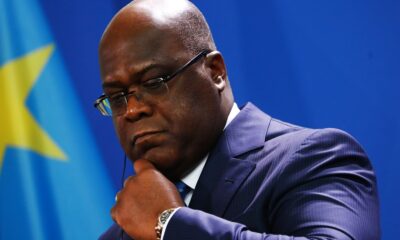

How South Africa, US elections could shape Tshisekedi’s bread in Kinshasa, By Charles Onyango-Obbo
Strictly Personal
Air Peace, capitalism and national interest, By Dakuku Peterside
Published
1 week agoon
April 16, 2024
Nigerian corporate influence and that of the West continue to collide. The rationale is straightforward: whereas corporate activity in Europe and America is part of their larger local and foreign policy engagement, privately owned enterprises in Nigeria or commercial interests are not part of Nigeria’s foreign policy ecosystem, neither is there a strong culture of government support for privately owned enterprises’ expansion locally and internationally.
The relationship between Nigerian businesses and foreign policy is important to the national interest. When backing domestic Nigerian companies to compete on a worldwide scale, the government should see it as a lever to drive foreign policy, and national strategic interest, promote trade, enhance national security considerations, and minimize distortion in the domestic market as the foreign airlines were doing, boost GDP, create employment opportunities, and optimize corporate returns for the firms.
Admitted nations do not always interfere directly in their companies’ business and commercial dealings, and there are always exceptions. I can cite two areas of exception: military sales by companies because of their strategic implications and are, therefore, part of foreign and diplomatic policy and processes. The second is where the products or routes of a company have implications for foreign policy. Air Peace falls into the second category in the Lagos – London route.
Two events demonstrate an emerging trend that, if not checked, will disincentivize Nigerian firms from competing in the global marketplace. There are other notable examples, but I am using these two examples because they are very recent and ongoing, and they are typological representations of the need for Nigerian government backing and support for local companies that are playing in a very competitive international market dominated by big foreign companies whose governments are using all forms of foreign policies and diplomacy to support and sustain.
The first is Air Peace. It is the only Nigerian-owned aviation company playing globally and checkmating the dominance of foreign airlines. The most recent advance is the commencement of flights on the Lagos – London route. In Nigeria, foreign airlines are well-established and accustomed to a lack of rivalry, yet a free-market economy depends on the existence of competition. Nigeria has significantly larger airline profits per passenger than other comparable African nations. Insufficient competition has resulted in high ticket costs and poor service quality. It is precisely this jinx that Air Peace is attempting to break.
On March 30, 2024, Air Peace reciprocated the lopsided Bilateral Air Service Agreement, BASA, between Nigeria and the United Kingdom when the local airline began direct flight operations from Lagos to Gatwick Airport in London. This elicited several reactions from foreign airlines backed by their various sovereigns because of their strategic interest. A critical response is the commencement of a price war. Before the Air Peace entry, the price of international flight tickets on the Lagos-London route had soared to as much as N3.5 million for the economy ticket. However, after Air Peace introduced a return economy class ticket priced at N1.2 million, foreign carriers like British Airways, Virgin Atlantic, and Qatar Airways reduced their fares significantly to remain competitive.
In a price war, there is little the government can do. In an open-market competitive situation such as this, our government must not act in a manner that suggests it is antagonistic to foreign players and competitors. There must be an appearance of a level playing field. However, government owes Air Peace protection against foreign competitors backed by their home governments. This is in the overall interest of the Nigerian consumer of goods and services. Competition history in the airspace works where the Consumer Protection Authority in the host country is active. This is almost absent in Nigeria and it is a reason why foreign airlines have been arbitrary in pricing their tickets. Nigerian consumers are often at the mercy of these foreign firms who lack any vista of patriotism and are more inclined to protect the national interest of their governments and countries.
It would not be too much to expect Nigerian companies playing globally to benefit from the protection of the Nigerian government to limit influence peddling by foreign-owned companies. The success of Air Peace should enable a more competitive and sustainable market, allowing domestic players to grow their network and propel Nigeria to the forefront of international aviation.
The second is Proforce, a Nigerian-owned military hardware manufacturing firm active in Rwanda, Chad, Mali, Ghana, Niger, Burkina Faso, and South Sudan. Despite the growing capacity of Proforce in military hardware manufacturing, Nigeria entered two lopsided arrangements with two UAE firms to supply military equipment worth billions of dollars , respectively. Both deals are backed by the UAE government but executed by UAE firms.
These deals on a more extensive web are not unconnected with UAE’s national strategic interest. In pursuit of its strategic national interest, India is pushing Indian firms to supply military equipment to Nigeria. The Nigerian defence equipment market has seen weaker indigenous competitors driven out due to the combination of local manufacturers’ lack of competitive capacity and government patronage of Asian, European, and US firms in the defence equipment manufacturing sector. This is a misnomer and needs to be corrected.
Not only should our government be the primary customer of this firm if its products meet international standards, but it should also support and protect it from the harsh competitive realities of a challenging but strategic market directly linked to our national military procurement ecosystem. The ability to produce military hardware locally is significant to our defence strategy.
This firm and similar companies playing in this strategic defence area must be considered strategic and have a considerable place in Nigeria’s foreign policy calculations. Protecting Nigeria’s interests is the primary reason for our engagement in global diplomacy. The government must deliberately balance national interest with capacity and competence in military hardware purchases. It will not be too much to ask these foreign firms to partner with local companies so we can embed the technology transfer advantages.
Our government must create an environment that enables our local companies to compete globally and ply their trades in various countries. It should be part of the government’s overall economic, strategic growth agenda to identify areas or sectors in which Nigerian companies have a competitive advantage, especially in the sub-region and across Africa and support the companies in these sectors to advance and grow to dominate in the African region with a view to competing globally. Government support in the form of incentives such as competitive grants ,tax credit for consumers ,low-interest capital, patronage, G2G business, operational support, and diplomatic lobbying, amongst others, will alter the competitive landscape. Governments and key government agencies in the west retain the services of lobbying firms in pursuit of its strategic interest.
Nigerian firms’ competitiveness on a global scale can only be enhanced by the support of the Nigerian government. Foreign policy interests should be a key driver of Nigerian trade agreements. How does the Nigerian government support private companies to grow and compete globally? Is it intentionally mapping out growth areas and creating opportunities for Nigerian firms to maximize their potential? Is the government at the domestic level removing bottlenecks and impediments to private company growth, allowing a level playing field for these companies to compete with international companies?
Why is the government patronising foreign firms against local firms if their products are of similar value? Why are Nigerian consumers left to the hands of international companies in some sectors without the government actively supporting the growth of local firms to compete in those sectors? These questions merit honest answers. Nigerian national interest must be the driving factor for our foreign policies, which must cover the private sector, just as is the case with most developed countries. The new global capitalism is not a product of accident or chance; the government has choreographed and shaped it by using foreign policies to support and protect local firms competing globally. Nigeria must learn to do the same to build a strong economy with more jobs.
Strictly Personal
This is chaos, not governance, and we must stop it, By Tee Ngugi
Published
2 weeks agoon
April 10, 2024
The following are stories that have dominated mainstream media in recent times. Fake fertiliser and attempts by powerful politicians to kill the story. A nation of bribes, government ministries and corporations where the vice is so routine that it has the semblance of policy. Irregular spending of billions in Nairobi County.
Billions are spent in all countries on domestic and foreign travel. Grabbing of land belonging to state corporations, was a scam reminiscent of the Kanu era when even public toilets would be grabbed. Crisis in the health and education sectors.
Tribalism in hiring for state jobs. Return of construction in riparian lands and natural waterways. Relocation of major businesses because of high cost of power and heavy taxation. A tax regime that is so punitive, it squeezes life out of small businesses. Etc, ad nauseam.
To be fair, these stories of thievery, mismanagement, negligence, incompetence and greed have been present in all administrations since independence.
However, instead of the cynically-named “mama mboga” government reversing this gradual slide towards state failure, it is fuelling it.
Alternately, it’s campaigning for 2027 or gallivanting all over the world, evoking the legend of Emperor Nero playing the violin as Rome burned.
A government is run based on strict adherence to policies and laws. It appoints the most competent personnel, irrespective of tribe, to run efficient departments which have clear-cut goals.
It aligns education to its national vision. Its strategies to achieve food security should be driven by the best brains and guided by innovative policies. It enacts policies that attract investment and incentivize building of businesses. It treats any kind of thievery or negligence as sabotage.
Government is not a political party. Government officials should have nothing to do with political party matters. They should be so engaged in their government duties that they literally would not have time for party issues. Government jobs should not be used to reward girlfriends and cronies.
Government is exhausting work undertaken because of a passion to transform lives, not for the trappings of power. Government is not endless campaigning to win the next election. To his credit, Mwai Kibaki left party matters alone until he had to run for re-election.
We have corrupted the meaning of government. We have parliamentarians beholden to their tribes, not to ideas.
We have incompetent and corrupt judges. We have a civil service where you bribe to be served. Police take bribes to allow death traps on our roads. We have urban planners who plan nothing except how to line their pockets. We have regulatory agencies that regulate nothing, including the intake of their fat stomachs.
We have advisers who advise on which tenders should go to whom. There is no central organising ethos at the heart of government. There is no sense of national purpose. We have flurries of national activities, policies, legislation, appointments which don’t lead to meaningful growth. We just run on the same spot.
Tee Ngugi is a Nairobi-based political commentator
EDITOR’S PICK


Nigeria’s NGX Group enters into strategic investment partnership with Ethiopian Securities Exchange
Leading Nigerian integrated market infrastructure group in Africa, the Nigerian Exchange Group (NGX), has announced strategic investment in the Ethiopian...


Namibia govt condemns tourists posing naked on Big Daddy Dune
The Namibian authorities have frowned at tourists who posed naked at the Big Daddy Dune, the country’s top tourist attraction...
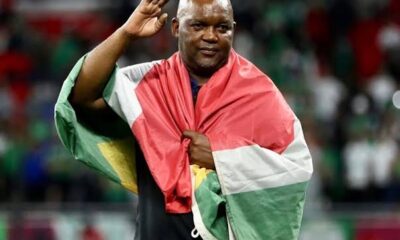

Domestic worker sues Pitso Mosimane, wife following debilitating injuries
Former Mamelodi Sundowns of South Africa and Al Ahli of Egypt coach, Pitso Mosimane, and his wife, Moira Tlhagale, have...


Media polarisation blamed for biased coverage, civil society leader calls for mindset shift
Chama Mwansa, Executive Director of the Chandarika Women and Youths Foundation, has attributed media biases to the similarities in coverage...


Nigeria: 118 prison inmates escape after rainstorm destroys facility
At least 118 inmates of the Medium Security Custodial Centre in Suleja, Niger State, in northern Nigeria, have reportedly escaped...


Tanzania’s auto-tech startup Spana is simplifying car maintenance— CEO
Tanzania’s auto-tech startup, Spana, has developed a mobile application for a bouquet of automobile services, enabling individual car owners and...


Nollywood thrown into mourning as another veteran actor Zulu Adigwe passes on
The Nigerian movie industry, popularly known as Nollywood, has once again been thrown into mourning with the death of veteran...


Zambian FA boss, Gen.Sec arrested over alleged laundering of K341,902
President of the Football Association of Zambia (FAZ), Andrew Kamanga, has been arrested along with the Secretary-General and two other...
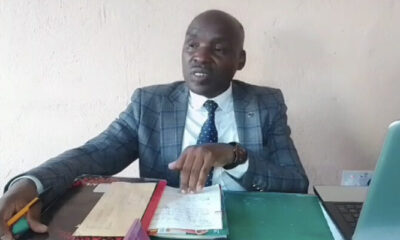

Luapula businessman, Munsanje, reflects on media freedoms and freedom of expression
As stakeholder engagement intensifies regarding the ongoing project to amplify voices on media freedom, freedom of expression, and digital rights,...
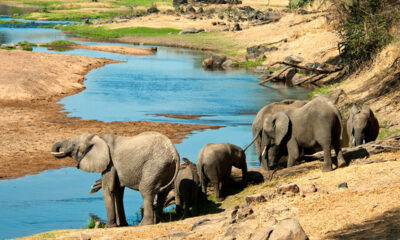

World Bank stops tourism fund to Tanzania’s Ruaha park. Here’s why
A spokesperson for the World Bank said on Wednesday that the lender had stopped all new payments from a $150...
Trending
-
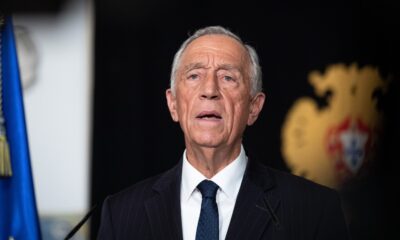
 Musings From Abroad2 days ago
Musings From Abroad2 days agoPresident de Sousa insists Portugal must ‘pay costs’ of slavery, colonial crimes
-

 Tech2 days ago
Tech2 days agoTanzania’s auto-tech startup Spana is simplifying car maintenance— CEO
-

 Politics2 days ago
Politics2 days agoDigital Rights: Policy enthusiast, Jere, advocates self-regulation as alternative to govt regulations
-

 Culture2 days ago
Culture2 days agoNollywood thrown into mourning as another veteran actor Zulu Adigwe passes on


